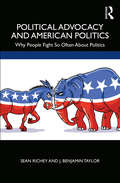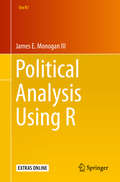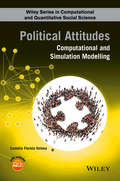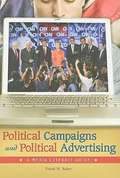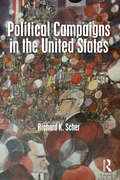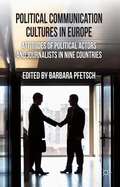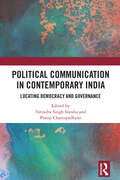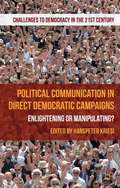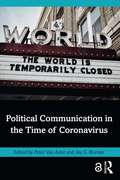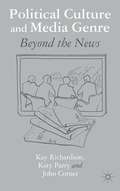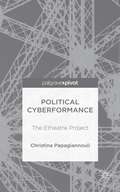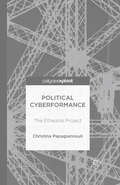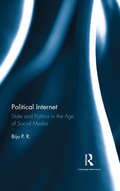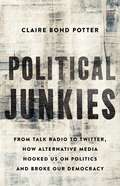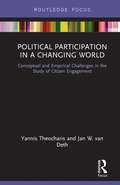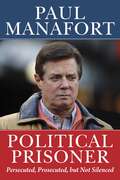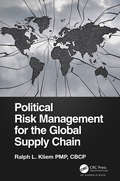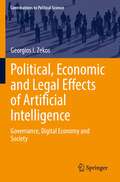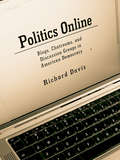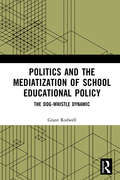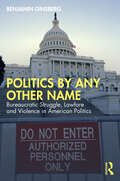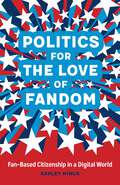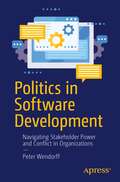- Table View
- List View
Political Advocacy and American Politics: Why People Fight So Often About Politics
by J. Benjamin Taylor Sean RicheyPolitical Advocacy and American Politics provides a detailed explanation as to why citizens engage in interpersonal advocacy in the United States. Sean Richey and J. Benjamin Taylor eloquently show how the campaigns, social media, and personality and partisanship affect one's propensity for candidates, which often leads to arguments about politics. Using original qualitative, survey, and experimental studies, Richey and Taylor demonstrate the causes of political advocacy over time in the political environment and at the individual level. While some worry about the incivility in American politics, Richey and Taylor argue political talk, where conflict is common, is caused by high-activity democratic processes and normatively beneficial individual attributes. Furthermore, Richey and Taylor argue that advocacy—when conceptualized as a democratic "release valve"—is exactly the kind of conflict we might expect in a vibrant democracy. Political Advocacy and American Politics: Why People Fight So Often About Politics is ideal for university students and researchers, yet it is also accessible to any reader looking to learn more about the role campaigns and personal attributes play in the decision to advocate.
Political Analysis Using R
by James E. MonoganThis book provides a narrative of how R can be useful in the analysis of public administration, public policy, and political science data specifically, in addition to the social sciences more broadly. It can serve as a textbook and reference manual for students and independent researchers who wish to use R for the first time or broaden their skill set with the program. While the book uses data drawn from political science, public administration, and policy analyses, it is written so that students and researchers in other fields should find it accessible and useful as well. By the end of the first seven chapters, an entry-level user should be well acquainted with how to use R as a traditional econometric software program. The remaining four chapters will begin to introduce the user to advanced techniques that R offers but many other programs do not make available such as how to use contributed libraries or write programs in R. The book details how to perform nearly every task routinely associated with statistical modeling: descriptive statistics, basic inferences, estimating common models, and conducting regression diagnostics. For the intermediate or advanced reader, the book aims to open up the wide array of sophisticated methods options that R makes freely available. It illustrates how user-created libraries can be installed and used in real data analysis, focusing on a handful of libraries that have been particularly prominent in political science. The last two chapters illustrate how the user can conduct linear algebra in R and create simple programs. A key point in these chapters will be that such actions are substantially easier in R than in many other programs, so advanced techniques are more accessible in R, which will appeal to scholars and policy researchers who already conduct extensive data analysis. Additionally, the book should draw the attention of students and teachers of quantitative methods in the political disciplines.
Political Attitudes: Computational and Simulation Modeling
by Camelia F. VoineaPolitical Attitudes: Computational and Simulation Modeling Camelia Florela Voinea, Department of Political Science, International Relations and Security Studies, University of Bucharest, Bucharest, Romania Political Science has traditionally employed empirical research and analytical resources to understand, explain and predict political phenomena. One of the long-standing criticisms against empirical modeling targets the static perspective provided by the model-invariant paradigm. In political science research, this issue has a particular relevance since political phenomena prove sophisticated degrees of context-dependency whose complexity could be hardly captured by traditional approaches. To cope with the complexity challenge, a new modeling paradigm was needed. This book is concerned with this challenge. Moreover, the book aims to reveal the power of computational modeling of political attitudes to reinforce the political methodology in facing two fundamental challenges: political culture modeling and polity modeling. The book argues that an artificial polity model as a powerful research instrument could hardly be effective without the political attitude and, by extension, the political culture computational and simulation modeling theory, experiments and practice. This book: Summarizes the state of the art in computational modeling of political attitudes, with illustrations and examples featured throughout. Explores the different approaches to computational modeling and how the complexity requirements of political science should determine the direction of research and evaluation methods. Addresses the newly emerging discipline of computational political science. Discusses modeling paradigms, agent-based modeling and simulation, and complexity-based modeling. Discusses model classes in the fundamental areas of voting behavior and decision-making, collective action, ideology and partisanship, emergence of social uprisings and civil conflict, international relations, allocation of public resources, polity and institutional function, operation, development and reform, political attitude formation and change in democratic societies. This book is ideal for students who need a conceptual and operational description of the political attitude computational modeling phases, goals and outcomes in order to understand how political attitudes could be computationally modeled and simulated. Researchers, Governmental and international policy experts will also benefit from this book.
Political Campaigns and Political Advertising: A Media Literacy Guide
by Frank W. BakerBaker, a media literacy consultant and author, has written this media literacy guide for general readers who want more critical insight into propaganda and spin, political advertising and the role of new media technologies in election campaigns. The author uses clear and easy-to-understand language to examine and interpret the content of media messages in print, image and multimedia forms in an objective manner. The author supplies both a timeline of the history of media in politics from 1913 to the present and a glossary of political and media terms. Annotation ©2009 Book News, Inc., Portland, OR (booknews.com)
Political Campaigns in the United States
by Richard K. ScherA Choice Highly Recommended Title—January 2017 This book is an interpretive analysis of political campaigns in America: instead of focusing on how campaigns are designed and run, it investigates the role campaigns play in our American politics, and the close symbiosis between campaigns and those politics. The text examines how campaigns are an important manifestation of how we "do" politics in this country. Hallmarks of this text include: showing how campaigns can undermine our democracy and asking how democratic they—and by extension, our politics--really are; demonstrating that the ability of the media to accurately, fairly, and deeply report on campaigns has been severely compromised, both because of the growing "distance" between campaigns and media outlets and because of the structure of "Big Media" corporate ownership and its tight relationship to "Big Money." It asks important questions about the media including: How do the media, reporters in particular, cover campaigns? What pressures and forces shape what and how they present campaigns? What is the impact of the ever-increasing chasm separating campaigns and the media? How does the close tie between corporate mainstream media and Super PAC money affect campaign coverage? How does the ability of campaigns and media to segment voters into ever-smaller slices influence how campaigns are covered? tracking the continuing growth of unregulated, private, unaccountable "dark money" in campaigns as a threat to our democratic elections and politics. Democracy rests fundamentally on transparency and accountability – sunlight – and our campaign laws and norms now allow and encourage exactly the opposite, largely because of decisions by the United States Supreme Court.
Political Communication Cultures in Europe
by Barbara PfetschThis book offers new and compelling insight into the orientations that shape the cultures of political communication in nine Western democracies. It is a truly comparative account of the views of 2500 political elites and media elites between Helsinki and Madrid on their relationship and their exchanges.
Political Communication in Contemporary India: Locating Democracy and Governance
by Yatindra Singh Sisodia Pratip ChattopadhyayThis book explores the forms, patterns, and trends in political communication in India in the twenty-first century. It underlies the influence of context in political messaging laying bare its complex, overlapping, and multidimensional structures. The volume: Examines how political decision-making is shaped by media — through political speeches, community opinion leaders, and formal and informal public conversations. Explores a range of political communication channels— from community radio to social media. Presents an overview of the problems associated with message designing and message dissemination through communication channels in a political setting. Highlights how political communication impacts critical aspects of democracy and governance and goes beyond mere rhetoric. A comprehensive work on the production, diffusion, transmission, and impact of information in a political environment, this book will be of great interest to scholars and researchers of politics, governance, democracy, media and communication studies, journalism, cultural studies, and South Asian studies.
Political Communication in Direct Democratic Campaigns
by Hanspeter KriesiAnalyzes the communication processes in direct democratic campaigns and their effect on the opinion formation of the voters. Based on a detailed analysis of the politicians' strategies, media coverage and the opinion formation of the public in three campaigns, this book argues that the campaigns are more enlightening than manipulating.
Political Communication in Postmodern Democracy
by Katrin Voltmer Kees BrantsThis book explores the changing relationship between politics, the media and citizens. Based on comparative evidence from the UK and the Netherlands it provides new insights into the dynamics of political communication in post-modern democracy, which is characterized by uncertainty about the location of politics and an erosion of grand narratives and political ideologies. The contributions of this volume aim to understand these changes as a two-dimensional process: the horizontal dimension encompasses the shifting power balance between politicians and the media. The vertical dimension explores how new forms of citizenship and the pervasiveness of popular culture alongside new communication technologies are challenging the authority of both established journalism and institutionalized politics. What emerges is a complex picture of politicization and de-politicization, elite dominance and the power of vox populi, mediatisation and effective control of political elites over the public agenda.
Political Communication in the Time of Coronavirus
by Peter Van AelstThis book examines how the COVID-19 pandemic impacted the flows of communication between politicians, journalists, and citizens. Distinguished contributors grapple with how the pandemic, as a global unexpected event, disrupted the communication process and changed the relationships between politics, media, and publics, the three central players of political communication. Using different methodologies, they scrutinize changes in government communication, (new) media coverage, and public opinion during this crisis. The book moves beyond the USA and Western Europe to include cases from Eastern Europe, Latin America, and Asia, taking into account how variations in the political context, the media system and personal leadership can influence how the COVID-19 pandemic challenged the political communication process. It is an ideal text for advanced students and scholars of political communication, political science, and media studies.
Political Culture and Media Genre
by John Corner Kay Richardson Katy ParryExploring the forms and meanings of mediated politics beyond the news cycle, this book encompasses genres drawn from television, radio, the press and the internet, assessing their individual and collective contribution to contemporary political culture through textual analysis and thematic review.
Political Cyberformance: The Etheatre Project
by Christina PapagiannouliWritten from a practice-based perspective, this book focuses on the political character of 'cyberformance': the genre of digital performance that uses the Internet as a performance space. The Etheatre Project comprises a series of experimental cyberformances aiming to reconsider the characteristics of theatre in the Internet age.
Political Internet: State and Politics in the Age of Social Media
by Biju P. R.This book investigates the Internet as a site of political contestation in the Indian context. It widens the scope of the public sphere to social media, and explores its role in shaping the resistance and protest movements on the ground. The volume also explores the role of the Internet, a global technology, in framing debates on the idea of the nation state, especially India, as well as diplomacy and international relations. It also discusses the possibility of whether Internet can be used as a tool for social justice and change, particularly by the underprivileged, to go beyond caste, class, gender and other oppressive social structures. A tract for our times, this book will interest scholars and researchers of politics, media studies, popular culture, sociology, international relations as well as the general reader.
Political Junkies: From Talk Radio to Twitter, How Alternative Media Hooked Us on Politics and Broke Our Democracy
by Claire Bond PotterA wide-ranging history of seventy years of change in political media, and how it transformed -- and fractured -- American politicsWith fake news on Facebook, trolls on Twitter, and viral outrage everywhere, it's easy to believe that the internet changed politics entirely. In Political Junkies, historian Claire Bond Potter shows otherwise, revealing the roots of today's dysfunction by situating online politics in a longer history of alternative political media. From independent newsletters in the 1950s to talk radio in the 1970s to cable television in the 1980s, pioneers on the left and right developed alternative media outlets that made politics more popular, and ultimately, more partisan. When campaign operatives took up e-mail, blogging, and social media, they only supercharged these trends. At a time when political engagement has never been greater and trust has never been lower, Political Junkies is essential reading for understanding how we got here.
Political Participation in a Changing World: Conceptual and Empirical Challenges in the Study of Citizen Engagement
by Jan W. van Deth Yannis TheocharisIn the last decades, political participation expanded continuously. This expansion includes activities as diverse as voting, tweeting, signing petitions, changing your social media profile, demonstrating, boycotting products, joining flash mobs, attending meetings, throwing seedbombs, and donating money. But if political participation is so diverse, how do we recognize participation when we see it? Despite the growing interest in new forms of citizen engagement in politics, there is virtually no systematic research investigating what these new and emerging forms of engagement look like, how prevalent they are in various societies, and how they fit within the broader structure of well-known participatory acts conceptually and empirically. The rapid spread of internet-based activities especially underlines the urgency to deal with such challenges. In this book, Yannis Theocharis and Jan W. van Deth put forward a systematic and unified approach to explore political participation and offer new conceptual and empirical tools with which to study it. Political Participation in a Changing World will assist both scholars and students of political behaviour to systematically study new forms of political participation without losing track of more conventional political activities.
Political Prisoner: Persecuted, Prosecuted, but Not Silenced
by Paul ManafortNEW BOOK CLAIMS DONALD TRUMP WILL RUN AND WIN IN 2024!A riveting account of the HOAX that sent a presidential campaign chairman to solitary confinement because he wouldn&’t turn against the President of the United States. The chief weapon deployed by the government-corporate-media Establishment against the Trump presidency was propaganda. Time and again, allegations from anonymous sources were disseminated by a partisan media, promoted by a dishonest Democrat Party leadership, and ultimately debunked when the facts surfaced. But by the time the truth came out, it was too late. There had already been casualties. One of the highest profile casualties was Paul Manafort. Desperate to defeat Donald Trump—or hamper his presidency after he won—Democrats and their Establishment allies colluded with foreign operatives to concoct a completely false narrative about Paul&’s supposed conspiracy with pro-Russian elements in Ukraine to further Vladimir Putin&’s efforts to influence the 2016 presidential election. But it wasn&’t just defamation of Paul&’s character. They took the unprecedented step of enlisting the US intelligence and law enforcement communities in using their power against President Trump and his campaign team. Political Prisoner finally exposes the lies left unchallenged by media who pronounced Paul guilty long before his case ever saw the inside of a courtroom. Not only is it untrue that Victor Yanukovych or any of Paul&’s clients were &“pro-Putin,&” it is the opposite of the truth. Paul&’s work in Ukraine and throughout his career was 100 percent aligned with US interests in the countries he worked in, sometimes even acting as a back channel for the White House itself. Neither was Paul guilty of laundering money, evading taxes, or deliberately deceiving the US government by failing to register as a foreign agent—which he wasn&’t. These were all politically motivated charges manufactured by the Special Counsel&’s team for one reason and one reason only: to get Paul to testify against Donald Trump about a conspiracy that never existed. When they hear the basis of these spurious charges, Americans will wonder what country they are living in and what has happened to our system of justice. Political Prisoner tells the real story of Paul&’s life and career, exploding the lies about his work in Ukraine, his previous work with foreign governments and business interests in other countries, his involvement with the Trump campaign, and the &“process crimes&” for which he was wrongly convicted and sent to prison. It is no exaggeration to say that everything most Americans think they know about Paul Manafort is false.
Political Risk Management for the Global Supply Chain
by Ralph L. KliemThe global business environment has never been so complex, making supply chains more fragile than ever. A stable business environment seems like a distant dream in today's global marketplace; instability, not stability, has become the norm. Anti-globalization and nationalization, coupled with populist movements and transnational terrorism, just to name a few targeting global supply chains, now pose significant challenges and risks when doing business across the globe. To address such issues, Political Risk Management for the Global Supply Chain: Provides an overview of basic political terminology and political risk management Presents the basic processes of political risk management Examines the current and future impacts of political events on global supply chains By putting aside the passions that politics can raise, the book aims to objectively look at political risk management. Topics covered include: Identifying different categories of political risk Understanding the relationship of political risk management, enterprise risk management, supply chain, project management, change management, and business continuity Laying the groundwork for efficient and effective political risk management Evaluating the effectiveness of responses The book begins with an overview on why political risk management is an important yet overlooked topic and the corresponding consequences if it is ignored or overlookedby enterprises and their global supply chains. Next, it provides systemic and systematic perspectives on political risk management and explains why the topic is more important than ever. Most important, it provides a framework that enterprises, regardless of nationality, can use to develop and deploy to manage political risks. The book concludes by discussing the full spectrum of developing, deploying, testing, and maintaining processes to conduct political risk management.
Political, Economic and Legal Effects of Artificial Intelligence: Governance, Digital Economy and Society (Contributions to Political Science)
by Georgios I. ZekosThis book presents a comprehensive analysis of the alterations and problems caused by new technologies in all fields of politics. It further examines the impact of artificial intelligence (AI) on the nexus between politics, economics, and law. The book raises and answers several important questions: What is the role of AI in politics? Are people prepared for the challenges presented by technical developments? How will Al affect future politics and human society? How can politics and law deal with Al's disruptive technologies? What impact will AI and technology have on law? How can efficient cooperation between human beings and AI be shaped? Can artificial intelligence automate public decision-making?Topics discussed in the book include, but are not limited to digital governance, public administration, digital economy, corruption, democracy and voting, legal singularity, separation of power, constitutional rights, GDPR in politics, AI personhood, digital politics, cyberspace sovereignty, cyberspace transactions, and human rights. This book is a must-read for scholars and students of political science, law, and economics, as well as policy-makers and practitioners, interested in a better understanding of political, legal, and economic aspects and issues of AI.
Politicians, Personal Image and the Construction of Political Identity: A Comparative Study of the UK and Italy
by Cristina ArchettiIs the media obsession with image leading to a degeneration of politics? Are politicians more concerned with their appearances than with policy substance? Through the evidence provided by over 50 interviews with politicians across the UK and Italy - local councillors, MPs and MEPs - this book provides a very different picture of the world of politics than the one we often cynically imagine. By relying on extensive excerpts from frank and colorful conversations with the interviewees, the analysis develops a new multidisciplinary model to understand the 'mediatization' of politics and the way the personal image of elected representatives is constructed in the age of interconnectedness.
Politics Online: Blogs, Chatrooms, and Discussion Groups in American Democracy
by Richard DavisDespite the growth of various forms of online discussion, their impact on American political life is only beginning to be examined systematically. In Politics Online Richard Davis provides a thorough analysis detailing the political attitudes, behavior, and demographic nature of the electronic discussion community contrasting that community with the general public.
Politics and the Mediatization of School Educational Policy: The Dog-Whistle Dynamic
by Grant RodwellDespite increasing prevalence over the past three decades and a clear impact on school education policy and practice, education’s connection to dog-whistle journalism and politics has not yet been fully explored. Addressing this gap, Politics and the Mediatization of School Educational Policy examines the emergence and current impact of dog-whistle politics and journalism on education in Australia, the US and the UK, questioning what is at stake when this political dog whistle is directed at school educational policy and practice. Exploring common targets for dog-whistling, such as teaching standards, teacher quality and specific curriculum areas, such as history, sex and health education, the book considers the broader social issues of xenophobia and racism, as well as the decline of print media and rise of digital news sources in its place, with each chapter including an in-depth discussion using peer-reviewed literature on the subject. Following the trail of dog whistles impacting in school educational policy and practice across these three countries, this book explores: To what extent is the dog-whistle dynamic embedded in school educational policy and practice? To what extent does the dog-whistle dynamic affect our understanding of school educational policy and practice? How might we explain the continued flurry of dog whistles impacting school educational policy and practice? As the phenomenon of the dog whistle intensifies both nationally and internationally, this timely and thought-provoking book is necessary reading for academics, postgraduate researchers and all members of school communities.
Politics by Any Other Name: Bureaucratic Struggle, Lawfare and Violence in American Politics
by Benjamin GinsbergThis book critiques a modern U.S. political system characterized by the partisan weaponization of bureaucratic systems and institutions.Competition for political power in the United States today is not just about winning elections. Competing political forces attempt to win at the polls, but they do not bet all their chips on electoral outcomes. Each party has built an institutional bastion within portions of the federal bureaucracy. Each party makes use of judicial and criminal proceedings for partisan purposes—a practice dubbed “lawfare” by the national media. And, acting through various surrogates, each party sponsors “violence by proxy,” to achieve its ends. To the extent that political struggles are fought outside the electoral arena, ordinary Americans have little or no voice in public affairs. And, unfortunately, in the United States today, a good deal of political struggle takes place outside the electoral arena.This book will be used in undergraduate and graduate classes in political parties, electoral politics, and in general U.S. government classes.
Politics for the Love of Fandom: Fan-Based Citizenship in a Digital World
by Ashley HinckPolitics for the Love of Fandom examines what Ashley Hinck calls “fan-based citizenship”: civic action that blends with and arises from participation in fandom and commitment to a fan-object. Examining cases like Harry Potter fans fighting for fair trade, YouTube fans donating money to charity, and football fans volunteering to mentor local youth, Hinck argues that fan-based citizenship has created new civic practices wherein popular culture may play as large a role in generating social action as traditional political institutions such as the Democratic Party or the Catholic Church. In an increasingly digital world, individuals can easily move among many institutions and groups. They can choose from more people and organizations than ever to inspire their civic actions—even the fandom for children's book series Harry Potter can become a foundation for involvement in political life and social activism. Hinck explores this new kind of engagement and its implications for politics and citizenships, through case studies that encompass fandoms for sports, YouTube channels, movies, and even toys. She considers the ways in which fan-based social engagement arises organically, from fan communities seeking to change their world as a group, as well as the methods creators use to leverage their fans to take social action. The modern shift to networked, fluid communities, Hinck argues, opens up opportunities for public participation that occurs outside of political parties, houses of worship, and organizations for social action. Fan-based citizenship performances help us understand the future possibilities of public engagement, as fans and creators alike tie the ethical frameworks of fan-objects to desired social goal, such as volunteering for political candidates, mentoring at-risk youth, and promoting environmentally friendly policy. Politics for the Love of Fandom examines the communication at the center of these civic actions, exploring how fans, nonprofits, and media companies manage to connect internet-based fandom with public issues.
Politics in Software Development: Navigating Stakeholder Power and Conflict in Organizations
by Peter WendorffEquip yourself to navigate organizational politics in the world of software development. This book will help you understand the power dynamics at work between competing stakeholders with conflicting goals in projects and organizations. Politics in Software Development consists of three main parts. Author Peter Wendorff begins by defining key concepts in organizational politics. He then moves on to software development processes and investigates how their design reflects stakeholder interests. In the final part, he highlights the role of political skill in software development and provides an overview of tactics that stakeholders frequently use. There is widespread competition within organizations for rewards, recognition, status, and power. It gives rise to political behavior of stakeholders, which is generally seen as a problem. This negative view of organizational politics tends to overlook its positive functions. For example, it can also be thought of as an arena where stakeholders with conflicting goals can argue, persuade, negotiate, bargain, and cooperate to address conflicts. Political conflict resolution regularly happens in organizations in an entirely civilized manner. It helps find agreements that reconcile differences in a constructive way, and it is needed because stakeholder conflicts are simply a natural aspect of organizations. While there is much literature about organizational politics, very few authors consider the specifics of software development. This book addresses both subjects and is written for an audience interested in a political perspective on software development. What You'll LearnRecognize and understand political activities in organizationsUnderstand what software processes have to do with stakeholder power and interestsAcquire fundamental political skills for dealing with politics in software development Who This Book Is For Project managers, lead developers, team leaders, team coaches, product owners, business analysts, developers, and other software professionals. This book is also suitable for students in software engineering.
